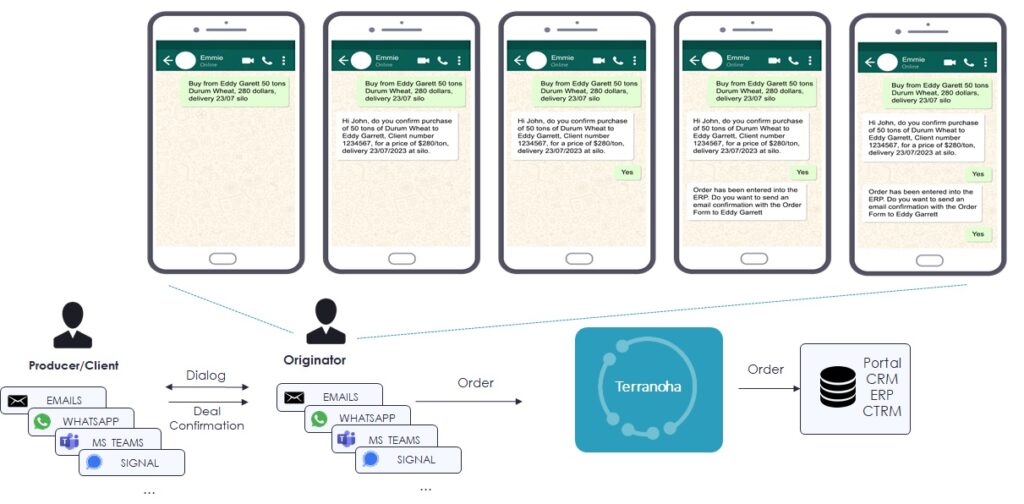Case study
AI/ML backed RPA in Commodity Trading
Challenge
A leading international agri-commodities trading company, faced a significant challenge in managing the manual and time-consuming processes involved in sourcing and originating agricultural products. These processes included:
Collecting data from various sources:
Information on crop yields, weather conditions, market prices, and supplier details were gathered from diverse sources like agricultural reports, weather forecasts, market research databases, and supplier websites.Data Entry and Analysis:
Manual data entry into spreadsheets and databases was prone to errors and time-consuming. Analyzing vast amounts of data to identify optimal sourcing opportunities was a laborious task.Negotiation and Contract Management:
Negotiating contracts with farmers and suppliers involved manual communication and document handling, on many different platforms e.g. Whatapp, email, etc. leading to delays and inefficiencies.
Get More Information
Solution
The company implemented Terranoha RPA solutions to automate several key tasks in their agri-commodity sourcing and trading process:
RPA bots were programmed to:
Initiate communication with potential suppliers & buyers based on predefined criteria. The communication made in their own comfort zone of specific messaging platforms, e.g. emails, Whatsapp, MS Teams, etc.
Facilitate trade confirmation on the respective messaging platforms.
Enter order details in the ERP, CRM or other platform and generate invoices.
Benefits
Increased Efficiency: Automating repetitive tasks freed up employees to focus on building relationships with suppliers, negotiating better deals, and managing risk.
Enhanced Data Accuracy: Eliminating manual data entry reduced errors and ensured data consistency for better decision-making.
Improved Sourcing Decisions: Data-driven insights from RPA enabled company to identify optimal sourcing opportunities and negotiate more favorable contracts.
Faster Cycle Times: Streamlined processes led to quicker identification of suppliers, faster contract finalization, and reduced time-to-market.
Reduced Costs: Automating tasks minimized labor costs associated with manual data entry and analysis.
Results
Trading company achieved a substantial reduction in the time it took to source and originate agri-commodities.
Data accuracy improved hugely, leading to more reliable insights for sourcing decisions.
The company was able to secure better pricing on average due to faster and more informed negotiations.
Employee productivity increased in double digits, allowing them to focus on higher-value activities.
Conclusion
Commodity trading company’s successful implementation of RPA demonstrates the significant benefits this technology can offer to the agri-commodities sector. By automating repetitive tasks and leveraging data-driven insights, RPA empowers companies to streamline their sourcing processes, optimize procurement costs, and gain a competitive edge in the global market.
Year
2023
Client:
Commodity Trading Company
Principal
Terranoha
Address:
International
RPA excels at automating rule-based tasks across various departments. Here are some common examples:
- Data entry and manipulation
- Invoice processing
- Customer service inquiries
- Report generation
- Email management
- Data reconciliation
- Back-office tasks
RPA security depends on proper implementation. While RPA itself can eliminate human errors that lead to breaches, neglecting security measures can introduce vulnerabilities. Here’s how we ensure secure RPA solutions:
- Layered Security Approach
- Least Privilege Access
- Continuous Monitoring
By following these practices, we can ensure that your RPA solutions are implemented securely and effectively.
While RPA offers significant benefits, it’s important to understand its limitations:
- Limited Cognitive Ability
- Process Dependency
- Integration Challenges
- Management Overhead
Despite these limitations, RPA remains a valuable tool. By strategically identifying suitable tasks and addressing limitations, you can leverage RPA to optimize your workflows and achieve digital transformation goals.
RPA excels at automating repetitive tasks, but it lacks the ability to “learn” or handle complex decision-making. This is where AI and Machine Learning (ML) come in.
AI and RPA (Intelligent Automation)
Machine Learning and RPA

